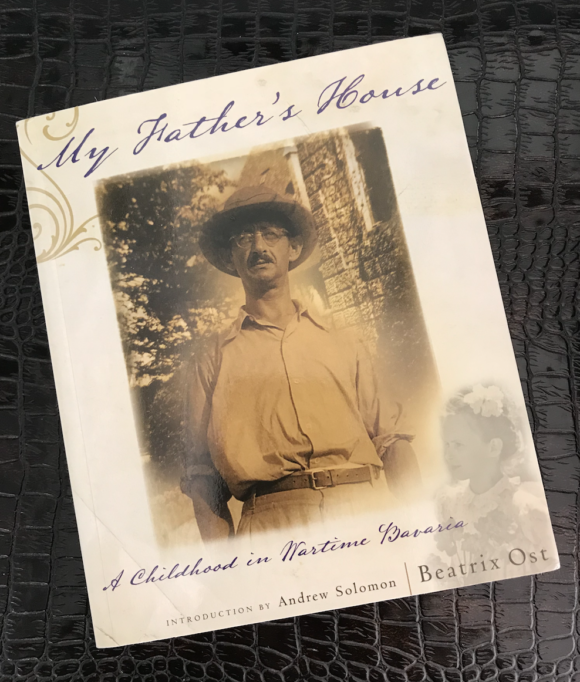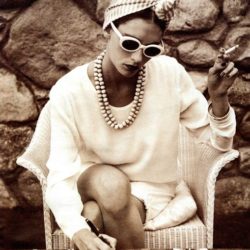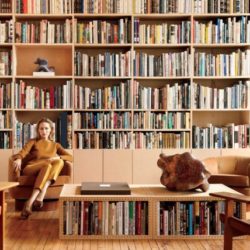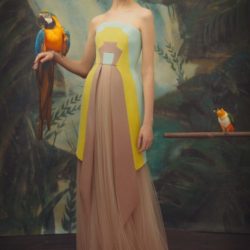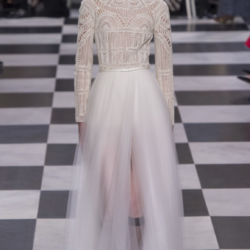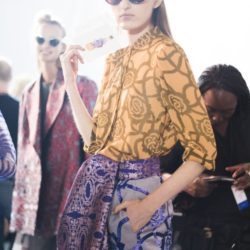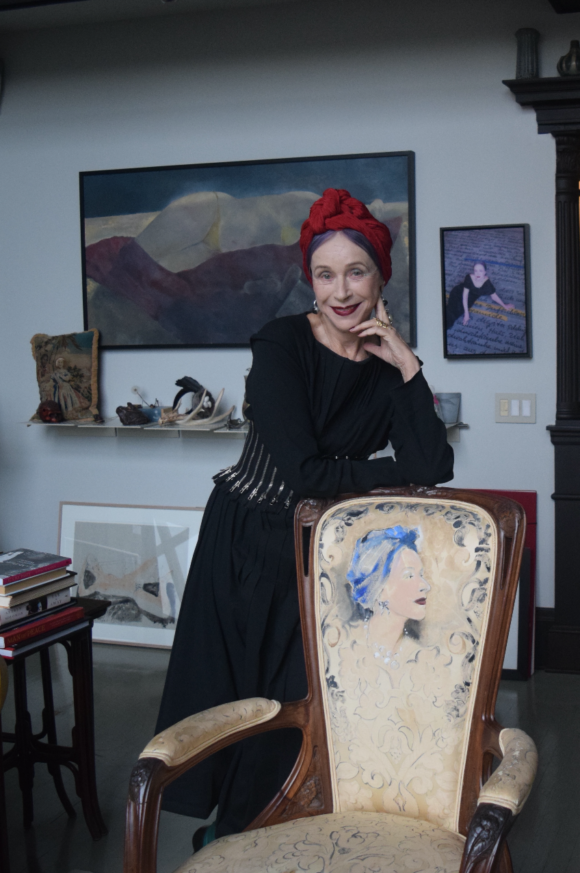
Last week I posted a photo on Instagram from a wonderful evening spent with Beatrix Ost. She was kind enough to join my book club to discuss her book, My Father’s House, which we had just read. The memoir is written through the eyes of a child growing up in Bavaria during World War II. It tells the story of how her intellectual family survived the madness of Hitler’s Germany by creating a self contained safe haven for those who resided on the farm and those who sought refuge there. I enjoyed it thoroughly and can hardly wait to read her following book, More Than Everything, a coming of age story in post war Munich. Until then here’s a repost of the interview I conducted with Beatrix.
Originally posted November 8,2017
Recently I had the pleasure to meet the artist and style icon, Beatrix Ost in her Manhattan home for a chat about her remarkable life.
She divides her time between New York and a historic estate near Charlottesville Virginia. Many of you will recognize her as the beauty with the purple pink hair, ruby red lips and turban. Beatrix has written two memoirs, My Father’s House, about growing up in wartime Bavaria and More Than Everything, a coming of age story set in post war Germany. In The Philosopher’s Style, Beatrix offers a collection of her short stories and interviews, lavishly illustrated with archival photos of her life and creative pursuits.
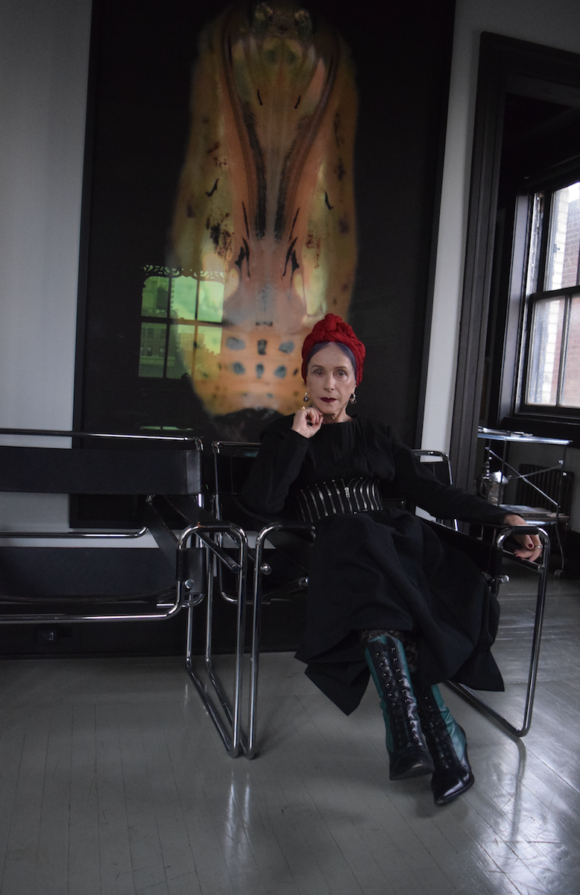
We started off by talking about her first book and how it came to be.
Beatrix Ost The first book I started for my children really. Someone in Germany read the first hundred pages and said this is not for your family alone, this has to be printed, this has to get out. It’s a private life in the end of the war. I write here, my selective sense of style requires a particular economy, which I learned from the lack of abundance in the aftermath of the war.
Jolain Muller What influenced you as a child and as a creative person?
BO Freedom to go out and explore Munich, the peace of being and to be admired for my mind. I was my father’s brainchild I was the clever one. Beauty was nothing; it’s not an achievement. Also the library in our home, my parents had a fantastic library.
But my influence as a personality, it’s written in my first book, I write about these Aunties that lived nearby and one of them obviously had an American officer as a lover. She would wear his jacket with a belt around her waist and a big flower bouquet on her shoulder, with the officer’s cap on, red lips, and those red shoes. My mother was always gorgeous in a dirndl, but that was not it. That was not an invention. This woman was an invention, her sister equally, they already had slacks that they would tie down there and wore them with these boots. I see it in front of me.
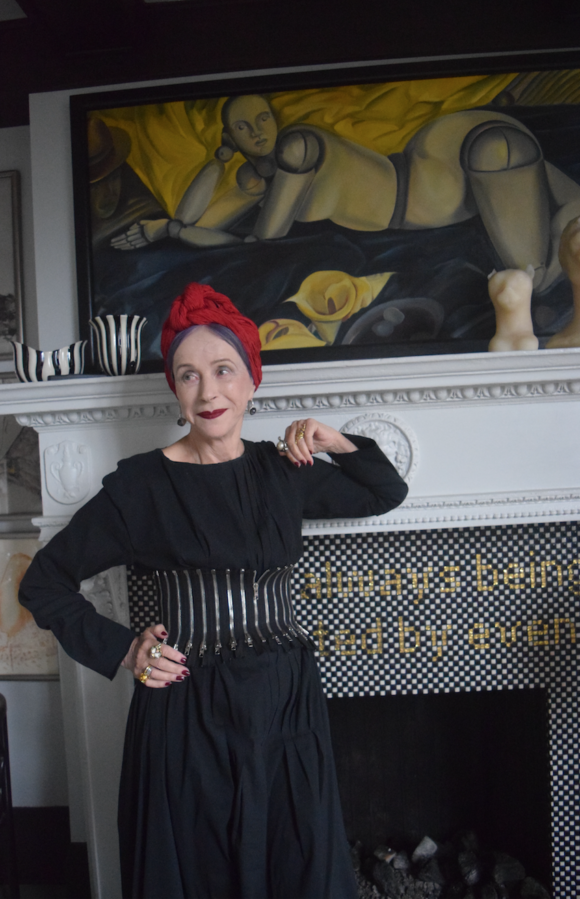
JM What was the general feeling in Germany after the war?
BO In post war Germany no one ever talked about the war. My family had a large estate and there was food so we always had a large table filled with 20 people everyday eating there. We never talked about the Hitler era, everyone looked forward, and it was forbidden at table. My father said, “let’s not look back, let’s look forward. We’re not going to talk about this inhumane person, this horrible, horrible man.” Looking forward, everything was discussed, food and what to make from what. The butcher would come to our house and butcher a pig to make sausages for the estate. Everything was about where to find this; it was a creation, complete recreation. There was an emphasis on culture, education, and the beauty of nature was very important. The garden, my mother’s garden was very important, there were always flowers. One talked about creating, making something out of nothing. And there was the silence, the national silence and our particular silence, only optimism.
JM You’re such an optimistic person, did that stem from your family?
BO Yes, you must glorify the day you wake up to, it’s given to you as a gift. Life is a gift. If you wake up and it’s a miserable day for you where do you go with that? Don’t even let it come at you.
JM Have you ever had a time in your life when your optimism was challenged?
BO I’ve had very tough times. I’m separated from my husband now, I turned this into something wonderful, and we are best friends. We have such a long life together, children, grandchildren, how can that not be glorious just because the last 5 years were not so glorious? Move on, yeah it’s not always easy but it is good. It’s optimistic and it’s a life, and you can make it. You can make it; you are the maker of every minute in your life.
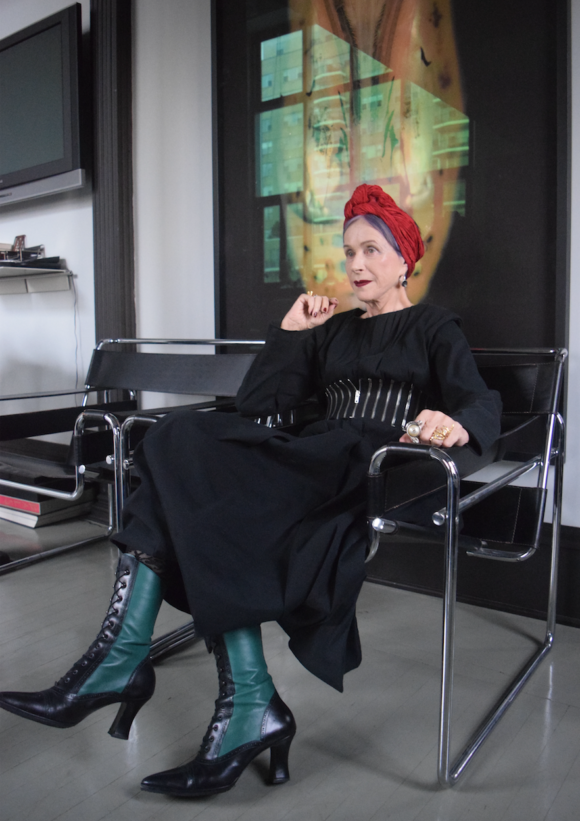
JM Which brings me to your saying that I love, “In your body is a good place to be”.
BO It’s the only house you have and you must appreciate it. A good idea is to take care of it because it is the best place to be, you cannot run away from it. It’s a Buddhist thing
JM How do you go about finding things? Do you actually shop with something in mind or do you buy when something strikes you?
BO Oh no I’m an awful shopper, I can’t bring myself to shop. I collect and I have a dressmaker that can fulfill some dreams of design. I’m not obsessive about it at all. Once in a while I get some fabric and sit together with him to create something. I have another thing, I really like when things are worn. I have a Gaultier jacket, it’s really fraying, it’s silk and it has the edges frayed, I just love it, I think it’s so chic. That was something from after the war, when people had their old clothes. My mother had one city suit which she would wear going to town. You can’t imagine, this is the end forties, I think we didn’t have a car until the early fifties. We had a coachman and horses and my mother would be coached to either the train station and go by train or go into Munich and there was a place where you could keep the horses. Then we would go to the tram and travel through the still very bombed out city. We’d go to visit somebody or go to a certain restaurant and deliver goods and then have a great dinner there. I see my mother in always the same striped suit from the thirties. I see this elegance more in the way she wore it than in the thing itself. My mother would also put a flower in her hair or on her shoulder.
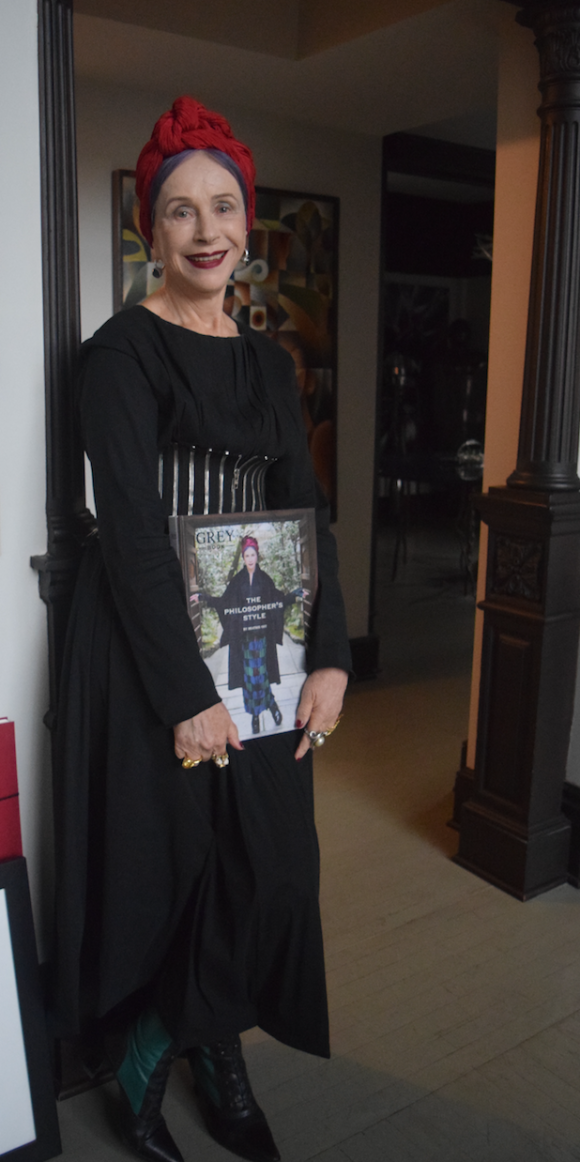
JM You famously wear clothes well and have an amazing figure. How do you maintain it?
BO It’s more knowing what to eat and what not to eat, I’m very good at it. I’m not addicted to anything, I’m not addicted to sweets, no sugar craving, once in a while I’ll have a little bon bon in a restaurant. When I drink wine I drive the waiters sometimes a little crazy. I have a pendulum, the waiter brings all the glasses of wine to taste and my pendulum tells me, which one is good for me.
JM Really? (Both laughing) I want one.
BO Get one.
JM Any one?
BO Yes any one.
JM I know that’s how you found your house in Virginia.
BO Yes!
For exercise I do Pilates but I’m not very sporty. I walk, I like to walk and I dance tango. In my Instagram you’ll see me dancing the tango when I go back to Charlottesville where I have lessons. I don’t know if I would ever be able to dance with another man, but with my teacher, it’s my tango period and it’s great fun. On Wednesday I have a day, the morning is free, and then tango and after tango I go to my meditation with a very fine friend, she is a very famous writer, her name is Donna Tart, a wonderful person. We go together to our Tibetan Meditation and have discussions with this monk, it’s a group of 10, 15 people and after that we go and eat and remember what the day brought us and what the meditation was good for and what came up and what was great. This is absolutely the best thing. The Tango is a kind of a physical meditation on movement and the movement is aroused by the moment the man gives you a little push and you know what to do, you follow him. It’s just the best day, tango and Tibetan Meditation. It’s wonderful, we can’t wait, and every Wednesday we do that.
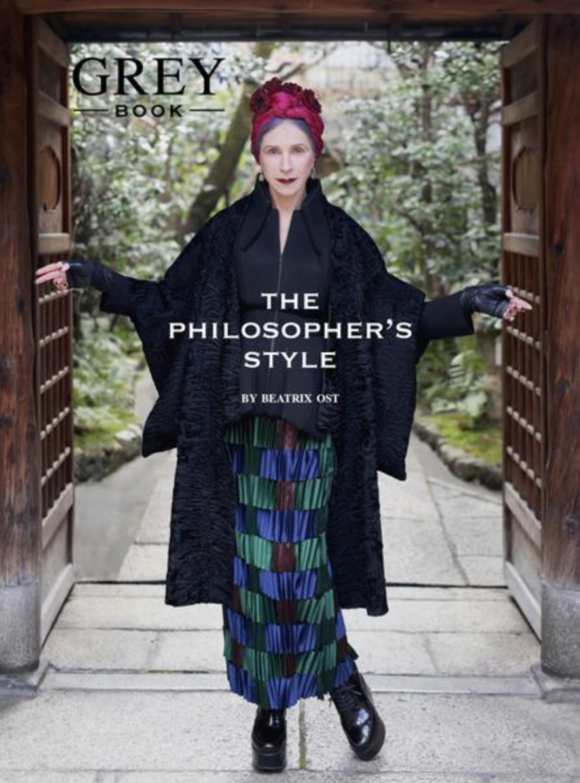
JM How do you divide your time between New York and Charlottesville?
BO I used to be here a lot when I did this book (Philosopher’s Style) because it has 40 interviews in it, I did like 60 interviews and wrote stories, stories, stories. Lots of photographs, it was two years. So I was here a lot, but now I’m here not so much. I really love Charlottesville; I have an apartment in town now so I’m not only on the farm. The town is so good to you, you know it’s small and it’s still and it’s intelligent, its crowded with wonderful, marvelous people, you know, like off beat people. It’s really a cool place. There’s fabulous food, it’s like a miniature New York in every direction. It’s enormously cultured, and has the university and Monticello. And the farm is beyond, a total exquisite place. It’s very, very beautiful the mountains remind me of Bavaria, the mountains before there are big Alps. As I said there’s an endless well of very interesting friends and neighbors and people. Or you can do still things; it’s a very good town. I like it there very much. When I come here (NY), I wasn’t here for I think 6 to 8 weeks, I feel very exhausted of the density of people when you’re outside and also the density of my appointments on top of it. I want to see everybody and everybody wants to see me.
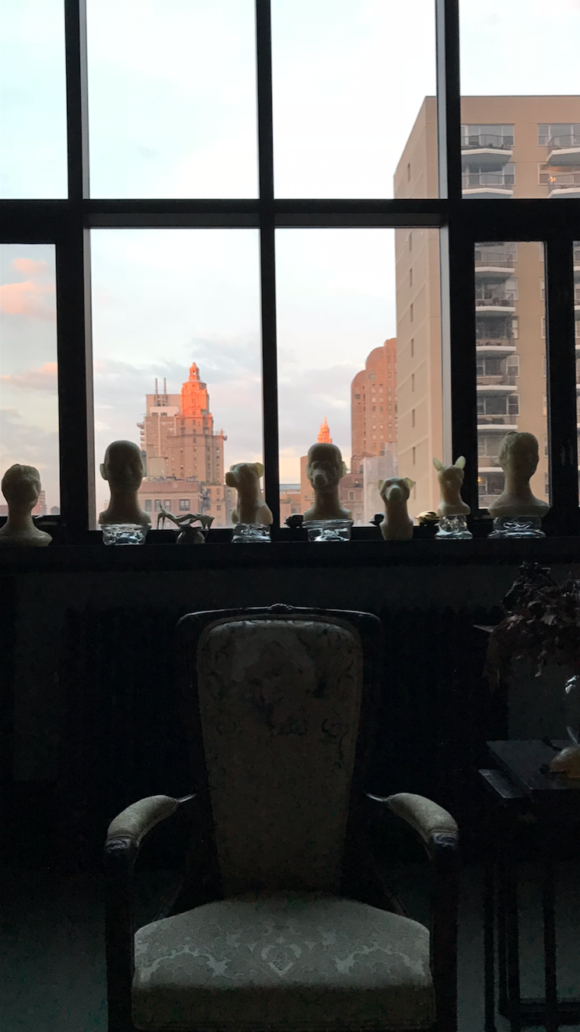
JM One last question, what do you think is the most important human quality?
BO I think gratefulness and openness. Being wide open, it just shocked into my mind, being wide open. I think this is something, then you are free to let everything in and you are like a sieve and you let the water through, you’re a in a wonderland of beauty and excitement. I mean I always adored in America the versatility of faces, you walk for an hour and you see practically the faces of the world. Ah New York is so interesting the whole world walks the streets. It is endlessly fascinating, I think to be wide open, it just came into my mind like that.
JM Thank you Beatrix Ost, it has been a real pleasure!
